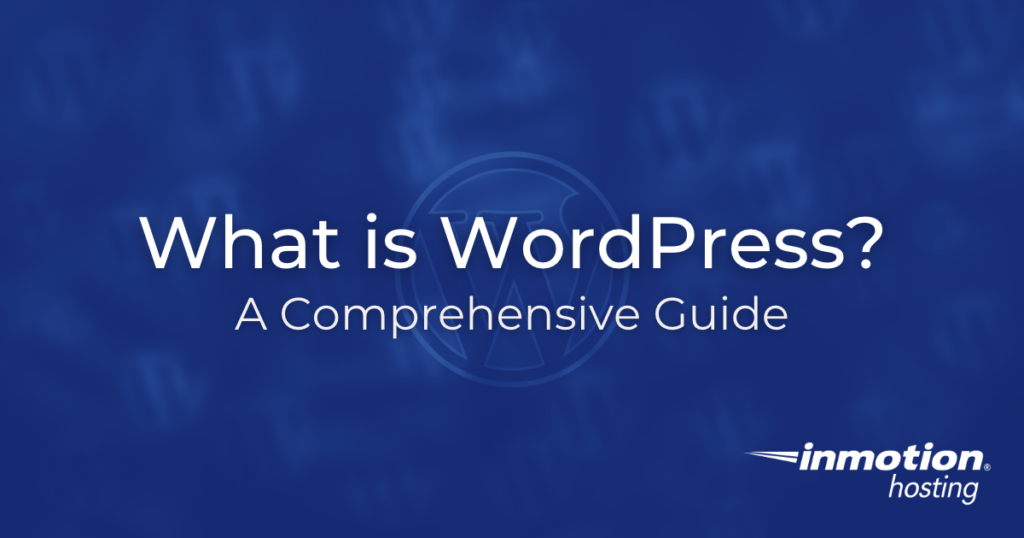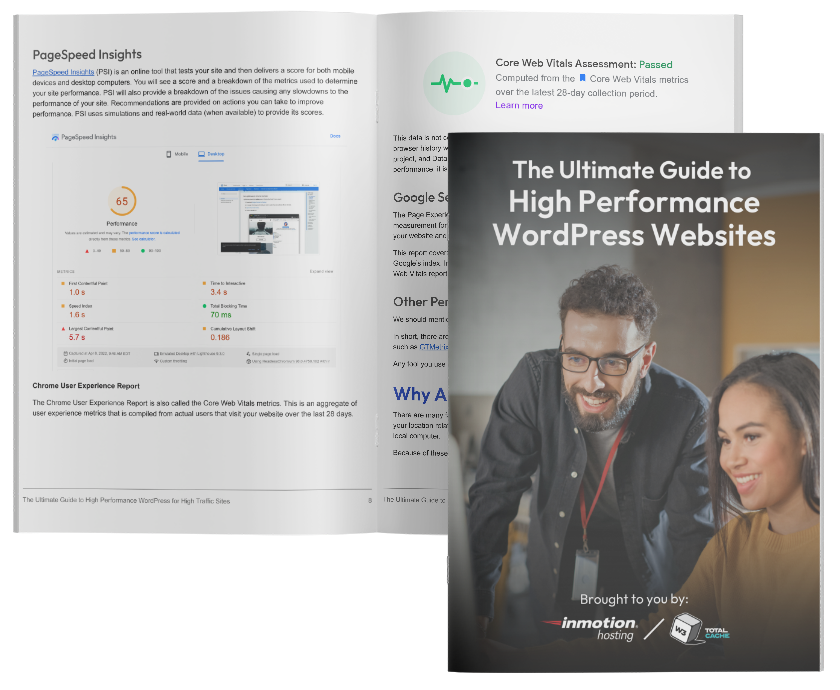
You’ve decided to build a website, but maybe you’re still wondering how much work that’s going to take. Chances are, someone has told you to keep things simple and just use WordPress.
There’s no doubt — WordPress is popular. It’s easy to learn, easy to find knowledgeable WordPress professionals, and easy to get started when you get WordPress Hosting that’s designed to keep your site running quickly and reliably. But what is WordPress, exactly? What does WordPress offer that other platforms don’t?
WordPress is popular, yes, but it’s popular for good reason. The platform is free, versatile, and incredibly customizable. Read below to learn more about everything WordPress has to offer and learn why it’s a great choice for your site, whether it’s for your first website of for the latest in a long line of professional pages.
- What Is WordPress?
- WordPress Benefits
- WordPress Is Developed with Security in Mind
- WordPress is Affordable
- WordPress-Optimized Hosting Speeds Up Your Sites
- WordPress Makes It Easy to Find Help
Please note that ‘WordPress’ can refer to two separate things: the free, open source software anyone can use, which is hosted at wordpress.org, and the paid hosting service provided at wordpress.com. We’ll be referring to the ‘.org’ version in the rest of this article, but if you’d like more information, read our article on the difference between WordPress.com and WordPress.org.
What Is WordPress?
WordPress Definition
The definition of WordPress: a free, open source content management system (CMS) and blogging platform that is user friendly. WordPress relies on the MySQL database service and PHP programming language to serve blog and page content to site visitors.
Currently, WordPress is ranked as the number one CMS in the world. Depending on the source, WordPress has between 50 and 65 percent of the CMS market and is used to create over 43.3% of all websites on the web today.
Complete Content Management System
WordPress is a complete content management system (CMS). What does this mean?
In the old days, when someone wanted to write a website, they would create numerous HTML files that became “pages” of the site.
The problem here was that the author would have to repeat themselves a lot, copying and pasting content that was meant to appear on each page.
Later, it was possible to dynamically update content on various pages using designated files and “server side includes“. But, as you can imagine, it grew tedious managing content for sites that grew to eventually hundreds or thousands of pages. What we now think of as “blogging” would be unmanageable.
Dynamic scripting languages like PHP helped simplify the process. This way, you could create a few template files and save the content in a database using MySQL. And the templates would generate the content based on the URL.
This is how WordPress works. Instead of creating and managing hundreds or thousands of files, you can manage all of your content from an efficient administrative dashboard — without requiring you to code every page yourself.
WordPress Anatomy
But when we’re talking about what a WordPress site actually is, we’re talking about a series of core files, theme files, and plugin files. This is also known as the anatomy of WordPress.
Core Files
At the core, WordPress is a series of PHP files developed by volunteers around the world. So when your hear someone talking about “WordPress Core” you’ll know what they’re talking about.
The core files provide the key functionality of WordPress. The core functions in these files are used by themes and plugins to customize WordPress.
Theme Files
Theme files control the look and feel of your site. They use special template files like header, footer, and sidebar, to generate pages of your site. So if you request a post, you’ll get the single blog post template. If you request a page, you’ll get the page template.
Plugin Files
Plugin files work similarly to theme files, but they let you introduce special functions into any site regardless of theme. Like special apps that perform specific functions, anyone can write a plugin and make it available to the world as long as they follow the WordPress coding standards.
Uses for WordPress
WordPress can create eCommerce sites, forums, donation pages, and more. It’s an excellent platform for a variety of different sites, whether you want to showcase your photography or teach others through a Learning Management System plugin. On top of that, WordPress has many search engine optimization (SEO) tools, both built-in and freely available. Getting your website online is great, but getting your website seen by others is what really counts.
WordPress Benefits
You don’t need to be an advanced programmer to use WordPress. Many people just open it up and start typing. When you’re ready to expand your website with extra features and a new design, it’s easy — because WordPress lets you add more features piece by piece while keeping your core site unchanged.
WordPress Dashboard and Editor
WordPress offers an intuitive and user-friendly interface that allows even non-technical users to easily create and manage content on their websites. This simplicity has made it accessible to a wide range of users, from beginners to experienced web developers.
Once you log into the WordPress Admin Dashboard, you can manage every aspect of your site, from creating posts to customizing menus, managing users, and extending functionality.
The native Gutenberg editor is built on the React JavaScript library for a modern, mobile-friendly, responsive site design. This helps keep WordPress looking modern while making it easier for developers to make modern yet user-friendly themes.
How does the WordPress Dashboard benefit you? You can do everything you need to maintain your site from one simple, easy to access location.
WordPress Themes
The largest draw to WordPress, perhaps, is that you can create a professional-looking, user-friendly website with no coding experience. WordPress offers an absolutely enormous library of themes for customizing your site.
Themes allow you to change colors, add logos, change the background, add sliders, and more. Whether you’re in business or the creative arts, there is something for everyone.
You can find thousands of free themes at WordPress.org, and countless others are available through third-party marketplaces and developers. You can change your theme as many times as you like, for an entirely different look, with no coding.
How do WordPress Themes benefit you? You can change the layout and design with just a few clicks. Choose professional themes and customize them to fit your brand, all without needing to hire a designer.
WordPress Posts and Pages
WordPress began as a blogging tool, and the ability to easily post new content is still front and center. A WordPress site does not require blogging, though! New pages are easy to add and link through WordPress’s built-in menu system.
How do Posts and Pages benefit you? Adding content is as easy as typing a document in a word processor.
WordPress Plugins
When it comes to customizing, the options are endless. Countless plugins allow for immeasurable design options and also add to the functionality. Bonus: a lot of the options are free!
Think of WordPress plugins like apps for your site. Plugins are just extra code you can add to your site for special tasks like creating backups or providing forms for your customers to fill in. Anyone can make plugins, from the official WordPress team to businesses to you yourself. Check out the WordPress Plugin Directory to see just how much is out there already.
How do WordPress plugins benefit you? Adding advanced features to your webpage is as easy as installing an app.
Multilingual Support
WordPress supports multiple languages and allows for the creation of multilingual websites, making it a versatile platform for a global audience.
WordPress Is Developed with Security in Mind
Security is a huge concern for many website owners. Luckily, WordPress’s core software is very secure, and developers regularly update it. There are several steps you can take on your own to make it even more secure. For instance, WordPress automatically installs smaller updates; but for major releases, you will have to manually initiate the update, and the same goes for your plugins and themes. However, plugins like Total Upkeep can be configured to backup your site before automatically installing a major release, and rollback when something goes wrong.
The popularity of WordPress contributes to its security. For starters, WordPress is constantly updated. Expert programmers examine every aspect of the software and update WordPress as soon as vulnerabilities are found. You can even turn on automatic WordPress updates so your site has the latest security improvements. On top of that, advanced security features are available through easily installed security plugins.
Bottom line: Keeping your site updated will go a long way toward securing it.
WordPress Is Affordable
The WordPress software itself is free. That means you can download it, deploy it, and customize it at no cost. In addition, many of the themes and plugins are totally free too.
But while WordPress itself is free, you do have to pay for hosting and a domain name. A domain name is the address of your website on the Internet, and your host is where your website is housed and all the files are stored. All in all, it’s still a far better deal than most other web platforms that charge you just to design and create your site.
If you need a new home for your WordPress site, look no further than InMotion’s WordPress Hosting solutions for secure, optimized, budget-friendly servers.
Fast & Easy Transfers
Free SSLs
Hack Protection
Affordable
WordPress-Optimized Hosting Speeds Up Your Sites
With the growing popularity of WordPress, it should come as no surprise that WordPress hosting options are also expanding. Currently, there are many options for hosting providers who are specifically optimized for WordPress sites.
On a traditional shared hosting platform, you might have hundreds of websites on one server, all spread over a dozen different content management systems. But, with WordPress-optimized hosting, these servers only contain sites built using WordPress. By doing this, the servers will run much faster (and your site will load and respond faster). Additionally, your site will be more stable as you have WordPress technical experts supporting your site.
Best of all, WordPress-Optimized hosting often includes specialized optimizations to improve the performance of WordPress itself. Software like NGINX allows WordPress sites to use advanced caching. This speeds up site response time and improves overall performance.

WordPress Makes It Easy to Find Help
Because WordPress is the most popular website creation tool in the world, there is an enormous support system. It’s not just WordPress that you can turn to for help: hundreds of blogs, support forums, and social media groups are dedicated exclusively to answering your WordPress questions.
To help get a better grasp of basic WordPress terminology, check out the official WordPress Glossary. Or visit the WordPress Codex, an online manual for WordPress and a living repository for WordPress information and documentation. For tutorials and walkthroughs to help make the most of your site, check out our WordPress Education Channel.

Your article is nice and very informative.
I simply wanted to say thanks again. I’m not certain the things I would’ve carried out in the absence of these points provided by you regarding such field. It was before a real daunting difficulty in my view, nevertheless considering the very skilled style you treated the issue took me to jump with fulfillment. Extremely grateful for the advice and then expect you comprehend what a great job that you’re putting in training the rest all through your site.